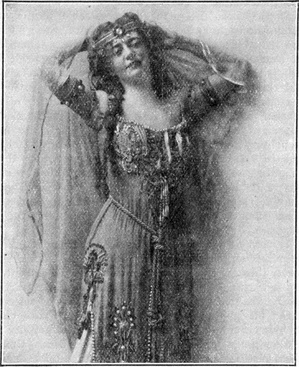[We are glad to give space in this issue to the following letter from a correspondent of The Etude, Miss C. M. Hook, now in Berlin. It gives some interesting details as to work in Grand Opera in this country and in Germany.—Editor.]
 Miss Florence Wickham, the young American opera singer of Pittsburg birth, who sang the rôle of Kundry in Conried’s Parsifal Company, has just completed an engagement at the Theater des Westens, up to this month (when the “Comic Opera” was opened) the only opera house in Berlin beyond the Royal Opera House. Miss Wickham has thus had experience of singing with both an American and a German opera company, and has some interesting comparative statements to make regarding the work in the two countries.
Miss Florence Wickham, the young American opera singer of Pittsburg birth, who sang the rôle of Kundry in Conried’s Parsifal Company, has just completed an engagement at the Theater des Westens, up to this month (when the “Comic Opera” was opened) the only opera house in Berlin beyond the Royal Opera House. Miss Wickham has thus had experience of singing with both an American and a German opera company, and has some interesting comparative statements to make regarding the work in the two countries.
It is not necessary to dwell again upon the one supreme advantage which opera work in Germany possesses as against opera work in America. It is the field—the immense width of field for study and sheer absorption of first-rank opera work which makes this land attractive for the ambitious singer who lives to learn.
“It is my ideal to sing in America entirely,” said Miss Wickham, whose views are typical of those held by the majority of young American artists studying here. “But at present I simply am unable to afford it—not that the salary in Germany begins to approach what one receives in America—as a matter of fact, it is comparatively a mere stipend, one-fifth of what one receives in the United States. It is from the view-point of artistic advancement that I found it necessary to return to Germany.”
As I said, the salary offered the opera singer in America is vastly superior to that obtainable in Germany (an artist who receives $500 weekly in America will get $100 here for the same work.) But there is another notable point to be observed: the demands made upon the singer are more exacting in America. She is required to work harder at rehearsals—in fact, the entire company in America works with more energy, will and ambition at rehearsals than is the case in Germany.
There is a particular difference to be observed between American and German choruses. In America the chorus-ranks are filled with beautiful, fresh, well-trained voices, whose owners are ambitious, intelligent and educated generally beyond the mere requirements of their work. In Germany, however, the standard is much lower. The German chorus singer is a type—in every opera house the same: a “gemütlich” well-fed and well-satisfied, unambitious cipher, which does its work (so far as that work goes) tolerably well, and there’s the end.
This generic difference is inevitable, and proceeds from easily-defined circumstances. In Germany it is comparatively—comparatively!—simple to obtain an engagement in opera, and talented singers do not always need to begin on the lowest rung of the ladder. In America, Grand Opera companies, on the other hand, are as rare of growth as ambitious opera singers are luxuriant. Hence it comes that the would-be American Grand Opera singer does not disdain the humblest position the manager can offer, and enlists in the ranks, willing to wait for promotion when it pleases promotion to come.
Miss Wickham re-tells the oft-told story of the initial difficulties of awaiting American girls who come to Germany to study for Grand Opera. In her own case, trouble met her at the outset. She arrived with commendatory letters addressed to Lilli Lehmann, and the distinguished singer having heard her, was cordial in her praise of the young American’s voice. “But,” she said, “it is impossible for me to accept you. I leave in two weeks’ time for a tournée in America.”
A similar disappointment, that of rejection by the chosen teacher, may await any student on arrival here. Continual call is made upon will, endurance and determination by all kinds of obstacles, of most unexpected descriptions, which one after another block the artist’s path.
Rarely, however, are these difficulties quite insuperable, and courage will usually win out in the end.



